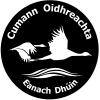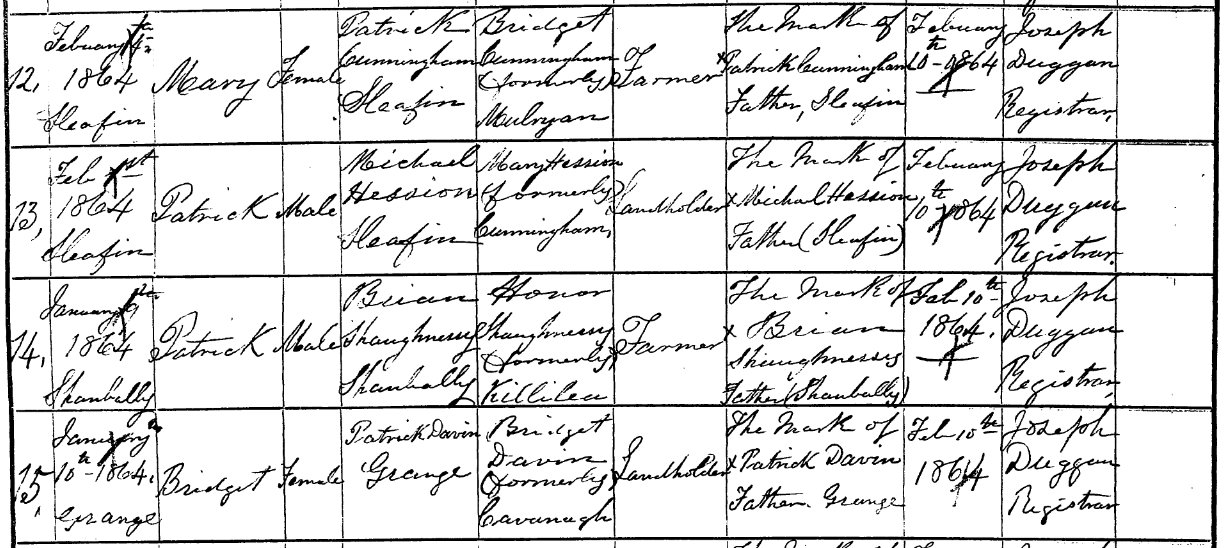Eanach Dhúin
le Antoine Ó Raifteirí
Má fháighmse sláinte is fada ‘bheas tráchtadh
ar an méid a báthadh as Eanach Dhúin.
‘S mo thrua amárach gach athair ‘s máthair,
bean is páiste atá ag sileadh súl.
A Rí na nGrásta, a cheap neamh is parthas,
Nár bheag an tábhacht dúinn beirt nó triúr,
ach lá chomh breá leis, gan gaoth ná báisteach,
lán a’ bháid acu, ‘scuab’ ar siúl!
Nár mhór an t-íonadh, os comhair na ndaoine,
iad a bhfeiceáil sínte ar chúl a gcinn,
screadadh is caoineadh, a scanródh daoine,
gruaig á cíoradh is an chreach á roínnt.
Bhí buachallí óg ann, tíocht an fhómhair,
Á síneadh ar chróchar ‘s á dtabhairt go cill,
‘S gurb é gléas a bpósta a bhí dá dtórramh
‘S a Dhia na Glóire, nár mhór an feall!
Ansiúd Dé hAoine chluinfeá ‘n caoineadh
Ag teacht gach taobh, agus greadadh bos,
Is a lán thar óiche trom tuirseach cloite,
Gan ceo le déanamh acu ‘ch ‘síneadh corp;
A Dhia ‘s a Chríost, a d’fhulaing iobairt,
A cheannaigh go firinneach an bocht ‘s an nocht,
Go parthas naofa go dtug’ tú saor leat
Gach créatúr díobh dar thit faoin lot.
Milleán géar ar an ionad céanna,
Nár lasa réalt ann ‘s nár éirí grian,
A bháigh an méid úd a thriall in éineacht
Go Gaillimh ar aonach go moch Déardaoin;
Na fir a ghléasadh cliath ‘gus céacht(a),
A threabhadh bréanra* ‘s a chroitheadh síol,
Is na mná dá réir sin a dhéanadh gach aon rud,
A shníomhadh bréid agus anairt chaol.
Baile Chláir a bhí in aice láimhe,
Níor lig an t-ádh dóibh a’ gha’l aníos,
Bhí an bás chomh láidir nár thug sé cairde
D’aon mhac máthar a rugadh riamh;
Mura scéal a ceapadh dóibh an lá seo a mbáite,
A Rí na Grást(a), nár bhocht an ní,
Ach a gcailleadh uile gan loch ná sáile
Le seanbhád gránna ‘s iad láimh le tír.
A Thomáis Uí Fhearaíl, diomú Dé d(h)uit,
‘S mo cailín spéiriúil a chuir tú ‘n báis
Le do sheanbhád a bhí lofa pléasctha,
Ag dul go haerach go Cnoc an Duláin.
Bhris an bád agus bádh na daoine,
Scaip na caoirigh amach sa snámh,
Is a Dhia! Nach ansin ‘bhí an t-ár mór déanta
Ar aon fhear déag agus ochtar mná.
A Sheáin Mhic Coscair, ba mhór an scéal tú,
Gur sheas tú riamh i long ná i mbád,
‘S a liacht(aí) coiscéim lúfar ‘shiúil tú
Ó Londain anall go dtí Béal Trá;
An uair a shíl tú snámh a dhéanamh,
Rug na mná óg’ ort ‘bhus is tháll,
‘S gur shíl do mhaithrín dá mbafaí céad fear,
Go dtiocfá féin chuici ‘bhaile slán.
Bhí Máire Ní Rúadháin ann, an buinneán gléigeal,
An cailín spéiriúil ‘bhí ‘gainn san áit,
Ghléas sí féin go moch Dé Céadaoin
Le dul chun aonaigh ó Chnoc Duláin;
Bhí cóta uirthi de thogha an éadaigh,
Caipín ‘‘lace” is ribíní bán,
Agus d’fhág sí a maithrín brónach cráite,
Ag sileadh deor’ arís go brách.
Loscadh sléibhe agus scalladh cléibhe
Ar an áit ar éag siad, is milleán crua,
Mar is iomaí creatúr ‘‘d’fhág sé faonlag,
Ag sileadh ‘s ag éagaoin go maidin Luain;
Ní doibháil eolais a chuir dá dtreoir iad,
Ach mí-ádh mór a bhí sa Chaisleán Nua,
‘S é críoch an ómhráin** gur bádh mórán
D’fhág ábhar dóláis ag Eanach Dhúin.
*branar
**amhráin
It should be noted that this is just one version of the poem; other versions can be found on various websites.
Béarla
Below is the version as sung by Liam Clancy. A more direct translation appears on the website of the Joe Heaney archive.
If my health is spared I’ll be long relating,
Of the boat that sailed out of Annaghdown,
And the keening after of mother and father,
As the laying out of each corpse was done.
O King of Graces, who died to save us,
It was a small affair but for one or two,
But a boat-load bravely on a calm day sailing
Without storm or rain to be swept to doom.
What wild despair was on all the faces,
To see them there in the light of day,
In every place there was lamentation,
And tearing of hair as the wreck was shared;
And boys there lying, when crops were ripening,
From the strength of life they were borne to clay,
In their wedding clothes for their wake they robed them,
O King of Glory, man’s hope is vain.
And then on Friday you’d hear them crying,
On every side as their hands they wrung,
And mourning found them unnerved and powerless,
When the laying out of each corpse was done.
O Jesus Christ, by the Cross You died on,
To offer Your life for the poor and the slave,
Bring them safely home to the light of glory,
O rest the souls of the drowned that day.
Misfortune light on the spot they died in,
May no star shine there or dawning ray,
It drowned such numbers who made the journey,
That fatal Thursday to Galway fair;
Men who could manage the plough and harrow,
And break the fallow and scatter seed,
And women whose fingers were deft and nimble,
To spin fine linen and frieze to weave.
On the shore beside Ballyclare was lying,
But fate was unkind when they made for port;
Strong Death was sudden, no pity stirred him,
No mother’s son could escape his stroke.
If their drowning day wasn’t fixed and fated,
O King of Graces, their lot was hard,
Not on lake nor ocean, yet weak and hopeless,
In a wretched boat, and in sight of land.
Thomas Farrell, may God curse you,
My sky-like girl you put to death,
And your old boat, that was rotten, burst
On the way to the fair at Fairhill.
The boat sprang a leak and let all the people
And frightened sheep out adrift on the tide,
It beats all telling what fate befell them,
Eleven strong men and eight women to die!
We mourn your loss, too, brave John Cosgrove,
You towered aloft in the ship or the boat,
And a long, long journey you came among us,
Across from London to Salthill’s shore.
When you tried to win to the shore by swimming,
You were held by women, your strength they broke;
But your mother was proud, and she’d say about you,
Though a hundred were drowned, you’d come safely home.
Mary Ruane was there, the star of maidens,
The sky-bright lady, the light of our lives,
She was long preparing, that morning early,
To go to the fair dressed up like a bride,
In a coat well made with a narrow waist-band,
A cap of lace and streamers of white,
But her mother awaited her footsteps vainly,
And never a day comes to dry her eyes.
May burning mountains come tumbling down,
On that place of drowning may curses fall,
For many’s the soul it has filled with mourning,
And left without hope of a bright day’s dawn.
The cause of their fate was no fault of sailing,
It was the boat that failed them, the Caisleán Nua,
And left me to make with a heart that’s breaking,
This lamentation for Eanach Dhúin.


